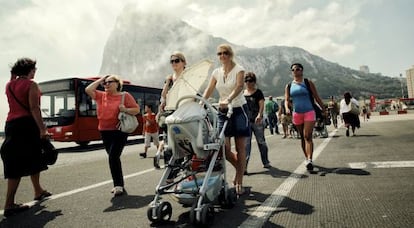What does Gibraltar live on?
The Rock's economic success is based on a combination of low taxation, online gaming, finance and the controversial practice of refueling ships at sea

In Gibraltar, the economy is a sensitive subject. The reason is obvious: it is doing very well. Last year, if it had been part of the IMF ranking of nations, it would have had the fourth-highest income per capita in the world, with 41,138 pounds (47,847 euros) a year. In just one year it would have risen from ninth to fourth, driven by an economy growing at 7.8 percent annually. How has it achieved this?
It takes just 40 minutes to walk from the north to the south of the territory, which has a surface area of 6.8 square kilometers. Despite Gibraltar's small size, it is home to 24,000 businesses. Obviously, a lot of them are virtual. When you are there, it is interesting to note what is missing: an army. The old British military base has been converted into a center for financial services, online betting operators and freight companies. Although the British military presence in Gibraltar accounted for 60 percent of GDP at the beginning of the 1980s, today it merely accounts for five percent.
This change shows the success of the Rock, claims James Tipping, director of the Gibraltar Financial Center. "Generally, a country — or a small jurisdiction, such as ours — has at most one or two sources of investment," he explains. However, "we search for the greatest diversification possible." On this foundation, the Gibraltarians have built a level of prosperity which gives them a GDP of 1.4 billion euros, which translates into an average monthly salary of 3,498 euros.
According to figures for 2011, the average yearly salary in Spain is 22,900 euros.
It has the fourth-highest income per capita of the world's 'nations'
The biggest change is the fostering of the online betting business: a paradox in a place with only one casino, built in the 1970s. Nearly all the big operators in the sector — including William Hill, Ladbrokes and Betfair — have an office in Gibraltar. These are a sea of high-definition screens and workers deep in concentration — more reminiscent of the scene in an investment bank trading room than a betting house.
What has brought them here? Without doubt, low taxation. When Betfair moved to Gibraltar in 2011, the company revealed that it would save 23.3 million euros in taxes.
"Internet companies are very easy to move overseas. By moving the businesses to the Rock they manage to relocate their profits and with that, the payment of levies," explains Jesús Lizcano, president in Spain of the NGO Transparency International. At the moment, there are 26 gaming licenses granted and the business of online gambling, with 2,500 workers, accounts for 15 percent of Gibraltarian wealth.
Another controversy comes from bunkering (the refueling of boats). This involves the transfer of 5 million metric tons of fuel a year from Gibraltar. Because Gibraltar does not have a lot of land, the fuel boats are permanently at anchor in the bay. This method of bunkering leads to oil spillages, says Antonio Muñoz, spokesman of the local Spanish environmental group Verdemar-Ecologists in Action. But a spokesperson for one of the main petroleum companies in the area refutes this claim, arguing: "The risk is very low and there are practically no spills."
The Gibraltarian government insists that companies are drawn there for reasons other than the purely fiscal in nature. "The tax level is not the basic criterion which determines whether a company will establish itself here," claims James Tipping. He lists other virtues: personal security, quality of life, the territory's business reputation, access to a unique market and costs. But what is certain is that there is no VAT, nor estate tax, inheritance tax, capital gains tax, nor any levy on tobacco. The maximum tax level for an individual is 25 percent, and taxes on companies are 10 percent (compared to 30 percent in Spain).
Our banks manage 7.1 billion in assets; Jersey over 152 billion
But is Gibraltar a tax haven? No, says the government. The Organization for Economic Cooperation and Development (OECD) has excluded Gibraltar from its list of tax havens after it signed 26 tax information exchange agreements with the EU. Although fiscal crime was previously only punished with three months in jail, since last January 1st the offense has carried up to seven years.
However, in Spain these arguments do not convince. "Here, a tax haven is a place that has a VAT of less than 21 percent, a marginal rate of income tax of less than 56 percent and a tax on companies that is less than 30 percent of their profits," says Paula Papp, an expert from International Financial Analysts. In addition, it is unlikely that the Spanish government will sign any agreement to exchange tax information with Gibraltar, as this would suggest that it recognized its territorial status.
In spite of all this, some observers believe that the off-shore sphere of Gibraltar is losing strength. "Business has been damaged by the crisis, by international vigilance of the territory and the fiscal amnesty which the Spanish government put in place," notes the director of a private Swiss bank. Without having heard these words, Tipping says: "Our banks manage just 7.1 billion pounds in assets, while in Jersey (a British island considered to be a tax haven) there are more than 152 billion." The financial sector accounts for 20 percent of the Rock's wealth, with 16 branches of international banks and 55 insurance companies located there.
The colony is also a source of employment. "Gibraltar is the most important factory that Andalusia has," says Juan José Uceda, spokesman of the Spanish Workers in Gibraltar Sociocultural Association. Last year, 3,609 Spanish people (16.7 percent of the total of 21,519 workers in Gibraltar) were employed on the Rock. The figure is 22 percent lower than in 2011, probably due to the decline in construction. Even so, Spanish people are taking jobs in hotels, home care and domestic services. Banking, the biggest business in Gibraltar, is still dominated by locals. There are only 26 Spanish people working in this industry.
Tu suscripción se está usando en otro dispositivo
¿Quieres añadir otro usuario a tu suscripción?
Si continúas leyendo en este dispositivo, no se podrá leer en el otro.
FlechaTu suscripción se está usando en otro dispositivo y solo puedes acceder a EL PAÍS desde un dispositivo a la vez.
Si quieres compartir tu cuenta, cambia tu suscripción a la modalidad Premium, así podrás añadir otro usuario. Cada uno accederá con su propia cuenta de email, lo que os permitirá personalizar vuestra experiencia en EL PAÍS.
En el caso de no saber quién está usando tu cuenta, te recomendamos cambiar tu contraseña aquí.
Si decides continuar compartiendo tu cuenta, este mensaje se mostrará en tu dispositivo y en el de la otra persona que está usando tu cuenta de forma indefinida, afectando a tu experiencia de lectura. Puedes consultar aquí los términos y condiciones de la suscripción digital.









































